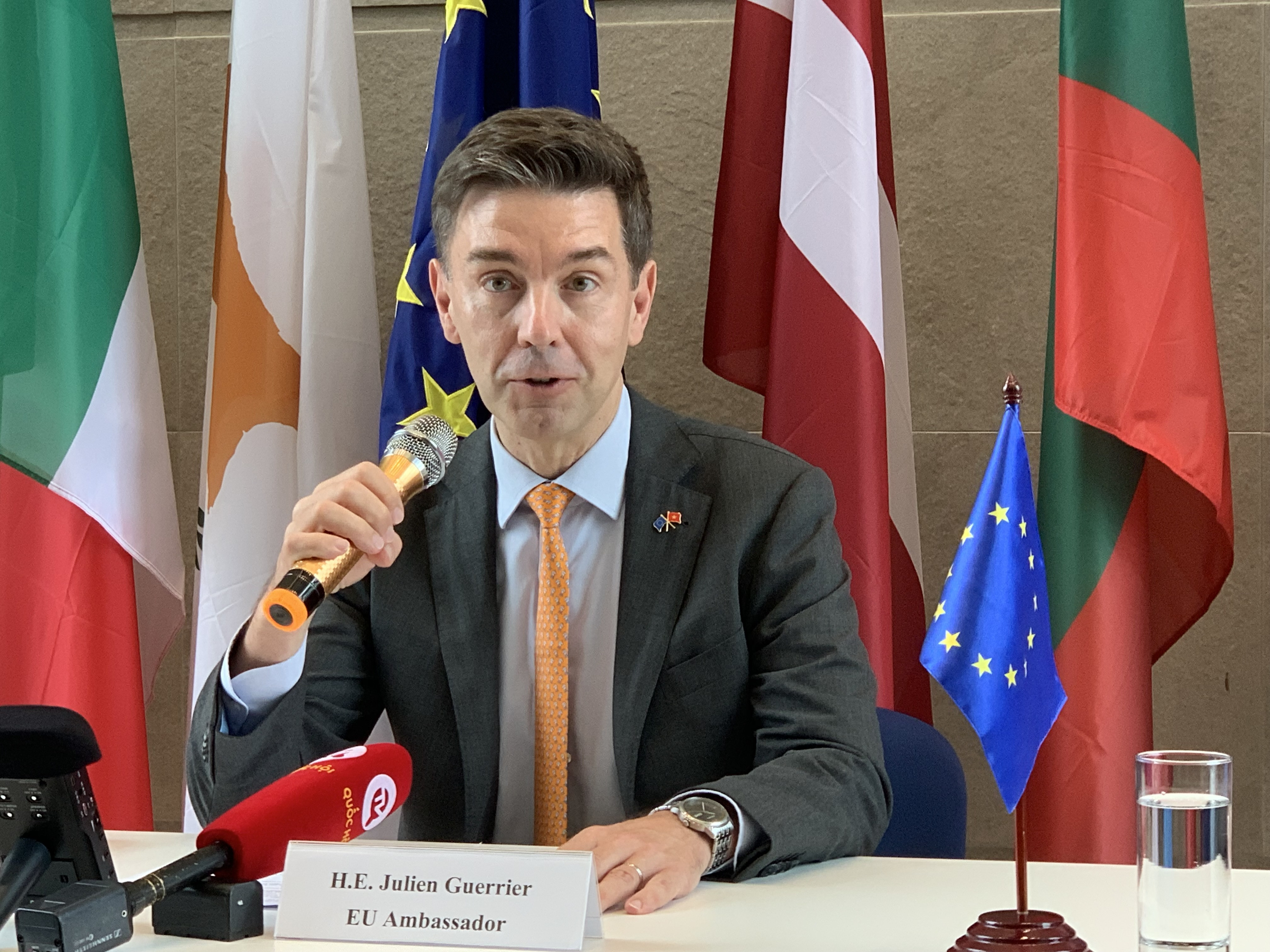
The ambassador has been to Vietnam many times and he was one of the members of the EU negotiating delegation for Vietnam's joining the World Trade Organization (WTO) 17 years ago.
In terms of work, the areas of cooperation between the two sides, both positive and negative, from trade promotion, investment, and energy transition to the ‘yellow card’ issued to Vietnam’s fisheries industry, will take up a lot of time in his working schedule.
He told the press at the EU head office in Hanoi that the Indo-Pacific is a very important region which has become the center of the world. He said the EU has set up a goal for strategic cooperation with the region, in which Vietnam plays an important role in economic development and holds an important position in population and geographical location.
“My mission in the next few years is advocating for and supporting Vietnam to implement its ambitious plan on becoming a high-income country by 2045 and obtaining zero emissions by 2050,” he said.
Standing by VN in energy transition
Vietnam’s goal of reducing net emissions to zero as committed at COP26 initiated by the EU and the US is very impressive. The ambassador affirmed that the EU, UK and other G7 countries are committed to supporting Vietnam's energy transition.
In late December, the Just Energy Transition Partnership (JETP) was deployed per the initiatives of G7 and other countries, aiming to shift from the use of fossil fuel to renewables.
JETP is expected to mobilize $15.5 billion from private investors and governments to support Vietnam’s green transition process in the next 3-5 years.
Two of the four ‘tasks’ Vietnam has committed to implement within the framework of JETP are limiting the coal-fired thermal-power capacity at no more than 30.2GW by 2030 instead of the initially planned 37GW; and accelerating the process of deploying renewable energy, so that it will account for at least 47 percent of total electricity output by 2030, higher than the initially planned 36 percent.
Vietnam has approved the eighth national power development plan (Plan 8) which sets goals for shifting from fossil fuel to renewables use. One of the goals is encouraging 50 percent of households and offices to install rooftop solar power systems.
Regarding capital for the transition, the World Bank predicted that to follow the roadmap for sustainably increasing net emissions, Vietnam needs investment of up to 6.8 percent of annual GDP, or $368 billion until 2040, and half of this amount, or $184 billion, is expected to come from the private sector.
The question is how Vietnam can arrange such a huge amount of capital if the country remains poor and Vietnamese are not ready yet to pay more for clean power.
He said that Vietnam has advantages and opportunities for energy transition. For example, VinFast, a Vietnamese automobile manufacturer, has decided to focus on electric vehicle manufacturing, and enjoys an advantage for pioneers.
He stressed that the energy transition will be costly, but it will create great opportunities. Vietnam, with advantages in natural conditions, such as the sea, wind and sun, can develop renewable energy with investment capital of $15.5 billion.
Promoting people-to-people diplomacy
The leading mission is promoting the investment and trade exchange between the EU and Vietnam through the Vietnam-EU Free Trade Agreement (EVFTA) which has brought big benefits to both sides in the last three years since it took effect.
The EU’s exports to Vietnam have increased by 18.5 percent this year compared with the same period last year, with turnover of 9.2 billion euros, while Vietnam’s exports were up by 32 percent.
The ambassador said the EU has the Global Gateway initiative worth 300 billion euros, reserved to fund infrastructure, education, healthcare, digital transformation, and green transition. The mechanism helps countries obtain their development goals and does not cause problems in public debt. He hopes that Vietnamese enterprises will grasp opportunities to access the fund.
Also, he introduced Horizon Europe, an investment fund for research and innovations.
He mentioned cooperation in national defense and security between Vietnam and the EU.
“I personally believe that Vietnamese and the EU’s people have common aspirations for Independence, freedom and happiness,” he said.
Tu Giang